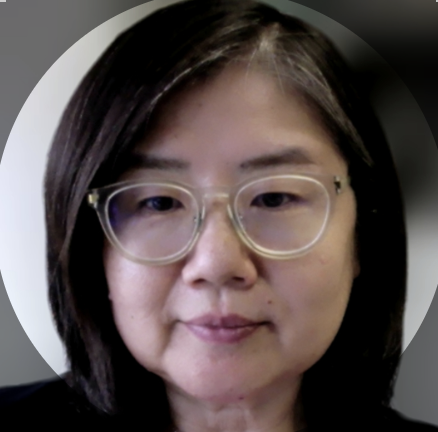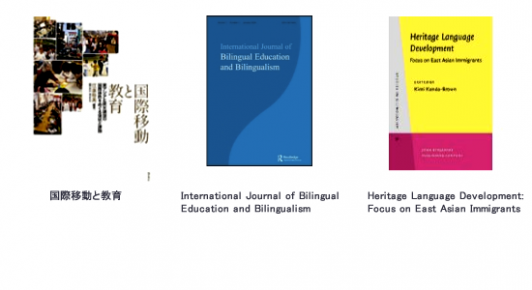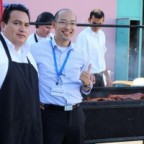坂本 光代 教授
学歴 Academic background |
||
|---|---|---|
|
トロント大学文理学部学士課程 卒業 トロント大学教育学部学士課程 卒業 トロント大学大学院修士課程 修了(第二言語習得) トロント大学大学院博士課程 修了(第二言語習得・多文化教育) B.A., University of Toronto B.Ed., University of Toronto M.Ed., University of Toronto Ph.D., University of Toronto |
 |
|
専門分野 Academic interests
- 言語教育というものは、認知学的側面はもちろん社会的要因も大きく関わっていると考えています。どのような社会環境の中で言語習得が育まれていくのか、逆にどのような社会要素がそれを妨げるのか。そういったことを解明していければ、と考えています。博士論文では社会文化理論(sociocultural theory)並びに活動理論(activity theory)に基づき、海外で母国語を保持している方々のケースを 用いて、その要因について考察しました。その結果、家庭で言語保持に積極的に取り組みたくても、社会的支援・要請がなければ、母語は三世代で喪失されうるという結論に達しました(Sakamoto, 2000; 2006)。言語というものは、一旦失くすと再習得するのにかなりの労力・時間・お金がかかります。また言語習得は言語そのものだけでなく、アイデンティティ構築や認知発達などにおいて様々な影響があります。せっかく習得した言語を数世代で失くすことに対しての危惧感を持ち、国として政策を立てるべきではないでしょうか。これにはまず在日されている非日本語話者や海外在住の方々の声に耳を傾ける必要があります。今まで自分は日本にある民族学校や、外国籍の方々のお宅や職場にお邪魔して聞き取り調査を、またヒントを得るためにカナダやブラジルで調査をしてきました。語学は様々な可能性をもたらしてくれます。これからの世代にそのような物を残すお手伝いが出来れば、と思っています。
Language learning entails social as well as cognitive dimensions. I am interested in pursuing what social factors are conducive/deterrent in language acquisition. Using sociocultural theory and activity theory, for my doctoral thesis I investigated those who are successfully retaining their mother tongue (L1) while living abroad. As a result, I reached a conclusion that L1 can disappear after three generations unless there are social support/demand for L1 maintenance. Once lost, language takes time, effort and money to revitalize it. Furthermore, language acquisition has repercussions not just for language learning per se but also for such things as identity construction and cognitive development. We ought to be informed of the dangers entailed in language loss, and as a nation we should establish sound language policies that encourage ethnolinguistic vitality. In order to do so, we must first give voice to those whose languages are at odds of survival. To date I have been engaged in ethnographic studies on ethnic schools and non-Japanese families in Japan as well as those living abroad. Language knowledge affords us numerous opportunities, and I hope I could contribute in some way so that as many languages could be valued, respected and co-exist in this increasingly diverse society. 担当科目 Courses provided at Department of English Studies
-
学部 Undergraduate
English Skills, ゼミ:批判応用言語学(Seminar: Critical Applied Linguistics), マイノリティ言語教育(Minority Language Education)大学院 Graduate
Qualitative Research Methods, Sociocultural Theory & SLA, Language and Power紹介
「他人を教育することはできません」社会文化理論を構築したロシアの心理学者ヴィゴツキーが残した言葉です(※ヴィゴツキー2005, p.25) 。これはどういうことでしょうか?教師が「知識」を直接学生にそのまま埋め込むことは出来ません。教師が提供するものに対し、学生が既に持つ知識や経験がリンクした時に初めて「学び」が実現します。人間はよって自分で自分を教育しているのです。教師として自分が出来る事はゆえに「多くの学びが実現し得る環境を学生に提供すること」だと思っています。例えばスキルズでのリーディングやプレゼンテーションのトピックなどは学生が選定します。またインタラクション豊富な教室環境を目指すため、ペアワーク、グループワークを奨励しています。3、4年次の授業では教科書は指定していますが、教科書の内容をそのまま鵜呑みにせず、「ここに書いてあることに対し、自分はどう考えるのか」「自分にとってここに書かれていることは、どういう意義があるのか」という姿勢を基にディスカッション・ベースの授業を展開しています。なお大学院では国際的に通用する院生の育成を目指しています。
※ヴィゴツキー、L. S./柴田義松・宮坂琇子(訳)(2005).『ヴィゴツキー教育心理学講義』東京:新読書社.
According to Vygotsky (2005, p. 25) "You cannot educate others". What does this mean? A teacher cannot straightforwardly implant knowledge into students. Rather, students only take in the things that make sense to them. That is, people can learn only by themselves. Therefore, I believe that my task is to provide an environment that would be conducive to learning. For example, in my Skills class, it is the students themselves who select readings and presentation topics. In order to actualize interactive classes, students often engage in pair and group work. In junior and senior courses I do use a course text, but students are encouraged to cultivate a critical stance by which they do not just readily absorb information but rather ask themselves the relevance of the work for them. At graduate level I aim to prepare my students to perform at par with other graduate students in the field worldwide. 主な著書、その他 Publications, Others
・坂本光代 (2011).「カナダにおける外国籍児童生徒の就学への対応:在トロント日系新移住者を事例として」 江原裕美(編)『国際移動と教育』(302-318頁) 東京:明石出版.
・Sakamoto, M. & Taylor, S. K. (eds.) (2009). Special Issue: Overcoming micro (school-based) and macro (societal) level constraints in the development of bilingualism and multilingualism. International Journal of Bilingual Education and Bilingualism 12 (3).
・Sakamoto, M. (2006). “Balancing L1 maintenance and L2 learning: Experiential narratives of Japanese immigrant families in Canada.” In K. Kondo-Brown (ed.) Heritage Language Development: Focus on East Asian Immigrants (pp. 33-56), John Benjamin Blackwell.



















